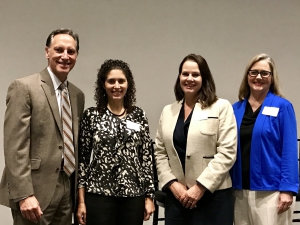Raising of Fort Worth Highlights Tulsa, Oklahoma
 The first stop on Raising of Fort Worth’s national best practices tour was Tulsa, Oklahoma. On Tuesday, April 4, 2017, the Raising of Fort Worth community welcomed panelists from the Educare Family Health Project and Smart Start Oklahoma who shared insights on how Tulsa has prioritized health in its work with young children and families.
The first stop on Raising of Fort Worth’s national best practices tour was Tulsa, Oklahoma. On Tuesday, April 4, 2017, the Raising of Fort Worth community welcomed panelists from the Educare Family Health Project and Smart Start Oklahoma who shared insights on how Tulsa has prioritized health in its work with young children and families.
Featured panelists for the April 5th event included:
- Debra Anderson, Executive Director, Smart Start Oklahoma
- Annie Berrett, Project Director, Educare Family Health Project
- Dr. Sarah-Anne Schumann, Medical Director, Educare Family Health Project
Robert Earley, President and CEO of JPS Health Network of Tarrant County, served as moderator for the panel.
Three overview documents provided useful background information for attendees:
- Demographics Comparison: Tulsa vs. Fort Worth
- Overview of Panel Organizations & Key Topics
- Tulsa Panelist Bios
Insights and recommendations from SmartStart Oklahoma’s experience included:
- Health Sector Must Be at the Table: Oklahoma recognized the importance of integration of health into early care and learning systems during the formation of the Oklahoma Partnership for School Readiness Board in 2003. Representatives from the health sector have been at the table from the beginning to help design improvements into the system and identify strategies to integrate health into all aspects of early care and learning.
- A Roadmap Helps Diverse Parties Identify Common Goals: Oklahoma developed a School Readiness Pathway that serves as a road map for planning early care and education (age 0-5) and this has been helpful for those who may not be experts in early childhood to understand the importance of the interconnecting pieces of the system.
- Family Voice Is Critical. Be mindful that strategies are developed with family voice as the primary driver for decisions. What families say they need to be successful may not be what providers would intuitively think. We often think the reasons children haven’t been enrolled in particular programs are because families just don’t know about them – but that might not always be the case. Understanding the root cause of the problem first will help develop solutions that address the real barriers and lead to better outcomes.
Key takeaways from the Educare Family Health Project (EFHP) included:
- Dual-Generational Model: The project purpose and goals include supporting not only the health of Tulsa Educare children but also the health of the children’s households – including parents and/or other caregivers.
- 3 Goals Integrating Early Ed & Health: EFHP strives to improve the health of Educare households (families with children age 6 weeks – 4 years) by ensuring they are: 1) connected to a medical home, 2) enrolled in affordable healthcare coverage, and 3) provided access to nutrition and other health-related education, healthy foods, exercise and fitness programs, as well as chronic disease prevention and management services, where appropriate.
- Vision of Bringing EFHP to Scale: The George Kaiser Family Foundation and Educare created EFHP to help break the cycle of generational poverty by addressing the health of both the children and the household members who impact and care for those children. The project is the only one of its kind within the Educare system and is intended to serve as a model that can ultimately be replicated at other Educare sites across the nation.
- Innovation with Families: Med Student/Educare Family Pairing Pilot: A pilot program in Tulsa pairs medical students with Educare families to help provide a health “mentor” and promote healthier outcomes for those children and their families.
Tulsa’s intentional emphasis on the health of both young children AND the members of households who impact children’s go-forward development is a best practice in the early childhood space. The scalability of this integrated approach is still a challenge, as private foundation funding has sustained the work of EFHP to date. Still, Tulsa has modeled an early education roadmap that has been translated in the health sector into tangible implementation, with families and healthcare leaders playing a critical role in the shared mission to end intergenerational poverty.
The Miles Foundation, First3Years, and the rest of the Raising of Fort Worth Committee members thank our Tulsa guests for sharing their experiences and reflections with us. We look forward to integrating these insights into our go-forward early health and learning work in Fort Worth.
Stay tuned for additional details regarding our next “Raising of Fort Worth Learning Tour” event in June 2017.
